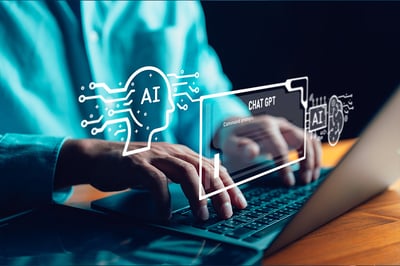Setting the stage for digital optimisation
As 2024 unfolds, it is clear that optimisation is the keyword for digital trends this year. From the insightful perspectives of The Frugal Architect shared by Dr. Werner Vogels, it is evident that artificial intelligence (AI) is the driving force behind this push for efficiency. Companies, large and small, are recognising the need to embrace AI not only for automation, but also for streamlining operations and maximising productivity. With examples like Twitter adopting organisational changes to stay competitive, it is evident that the year of optimisation is upon us. In this blog, we will dive deeper into the overall digital trend of 2024 and explore how companies are harnessing the power of AI and other technologies to optimise their processes and achieve success.
 The importance of streamlining and efficiency in the digital age
The importance of streamlining and efficiency in the digital age
Streamlining operations and maximising efficiency have become crucial for businesses seeking success. With increasing reliance on AI and other technologies, companies are recognising the importance of optimising their processes to stay competitive. Streamlining operations not only improves productivity, but also enhances customer experiences. By eliminating unnecessary steps and automating manual tasks, companies can deliver faster, more efficient services. This not only saves time and resources, but also allows businesses to allocate their workforce to more strategic initiatives. Efficiency, on the other hand, enables companies to make the most of their resources. By leveraging AI-powered algorithms and analytics, businesses can make data-driven decisions, identify areas for improvement, and optimise their operations accordingly. This improves overall performance and also enables organisations to adapt quickly to market changes.
Increasing the power of data analytics for business advancement
Data analytics has emerged as a game-changer for business advancement. By harnessing the power of data analytics, companies can gain valuable insights into their operations, customers, and market trends. This information is instrumental in making informed decisions and driving strategic initiatives. Data analytics allows businesses to tap into the vast amount of data they generate and identify key patterns, trends, and correlations. With the help of AI-powered algorithms, companies can uncover hidden opportunities, optimise processes, and even predict consumer behaviour. This enhances operational efficiency while enabling organisations to stay agile and responsive in an ever-evolving market. Data analytics empowers businesses to personalise offerings and tailor marketing strategies to individual customer preferences, delivering targeted campaigns and personalised experiences, which in turn fosters customer loyalty and drives revenue growth.
 The rise of AI and automation
The rise of AI and automation
The rise of AI and automation plays a significant role in data-driven decision-making and its impact on business success. AI-powered algorithms have the ability to process vast amounts of data at a rapid pace, enabling businesses to optimise their operations and drive efficiency. Through automation, tasks that were once labor-intensive and time-consuming can now be performed with precision and speed. This not only frees up valuable time for employees to focus on more strategic initiatives, but also reduces the margin of error, resulting in improved accuracy and effectiveness. In addition, AI and automation have revolutionised customer service and engagement. Chatbots and virtual assistants, equipped with natural language processing capabilities, are now able to provide personalised assistance to customers, improving the overall customer experience and satisfaction. With the continuous advancement of AI and automation, businesses have the opportunity to streamline processes, reduce costs, and enhance productivity.
Enhancing user experience in a mobile-first era
The increasing prevalence of mobile devices in our daily lives has led to a significant shift in the way businesses approach their digital strategies. In 2024 we are truly living in a mobile-first era, where consumers expect seamless and user-friendly experiences across all devices. To meet these demands, businesses are prioritising the optimisation of websites and applications for mobile devices. This includes implementing responsive design, which ensures that content adapts and displays correctly on screens of various sizes. Additionally, businesses are focusing on optimising loading speeds, as slow-loading websites can drive users away and result in lost opportunities. User experience (UX) design is at the forefront of this optimisation. By understanding user behaviour, needs, and pain points, businesses can create intuitive interfaces and navigation structures that enhance usability. This can include features such as simplified checkout processes, personalised content recommendations, and easy-to-use search functions. In order to stand out in a crowded app marketplace, businesses must prioritise app performance, security, and seamless integration with other systems.
 Embracing personalisation: Tailoring content and experiences to individual preferences
Embracing personalisation: Tailoring content and experiences to individual preferences
Another key trend that has emerged in the digital landscape is the importance of personalisation. Businesses are understanding the significance of tailoring content and experiences to individual preferences in order to create meaningful connections with their customers. Gone are the days of one-size-fits-all marketing approaches. With advancements in data collection and analytics, businesses now have the ability to gather valuable insights about their customers, such as their browsing behaviour, purchase history, and demographic information. This wealth of data allows businesses to create targeted campaigns and deliver personalised content that resonates with each individual. Personalisation goes beyond simply addressing customers by their names in emails. It involves understanding their preferences and delivering relevant recommendations, offers, and experiences. This could include personalised product recommendations based on past purchases, customised emails with content that aligns with their interests, or even personalised landing pages that cater specifically to their needs. By embracing personalisation, businesses can create a more engaging and valuable experience for their customers, building stronger relationships, increasing customer loyalty, and ultimately driving conversions and sales.
The growing significance of cybersecurity measures in an increasingly connected world
As the digital landscape continues to evolve and become more interconnected, the need for robust cybersecurity measures has never been more crucial. As personalisation takes centre stage, businesses must also prioritise the security of their customers' data and protect against cyber threats. With the rise of data-driven marketing and personalisation strategies, businesses are collecting and storing large amounts of sensitive customer information. This includes personal details, payment information, and browsing behaviour. Any security breach or data leak can have severe consequences not only for the affected individuals, but also for the reputation and trust of the business. To address this growing concern, organisations must invest in advanced cybersecurity solutions and implement strict protocols to safeguard customer data. This involves employing encryption techniques, conducting regular vulnerability assessments, and staying up-to-date with the latest security patches and updates. Businesses can also educate their employees and customers about cybersecurity best practices, such as using strong passwords, enabling two-factor authentication, and being cautious of phishing attempts. By prioritising cybersecurity, businesses can protect both themselves and their customers from potential cyber threats.
 Embrace the year of optimisation for a successful digital future
Embrace the year of optimisation for a successful digital future
It is evident that optimisation is the key to success in the ever-evolving digital landscape. From personalised experiences to robust cybersecurity measures, businesses must prioritise the optimisation of their strategies and processes. By embracing personalisation, businesses can enhance customer engagement, drive conversion rates, and ultimately increase revenue. The ability to tailor products, services, and marketing messages to each individual's unique preferences creates a deep connection that fosters loyalty and trust. However, businesses cannot afford to overlook the importance of cybersecurity. With the escalating number of data breaches and cyber threats, ensuring the security of customer data is paramount. By investing in advanced cybersecurity solutions, implementing strict protocols, and educating employees and customers about best practices, businesses can safeguard sensitive information and maintain the trust and loyalty of their customer base. In 2024, the year of optimisation, businesses must strive for excellence in all aspects of their digital strategies. By continuously evaluating and improving their processes, embracing new technologies, and staying ahead of the curve, they can navigate the digital landscape with confidence and achieve remarkable success. So, let us embark on this journey of optimisation together and create a digital future that is secure, personalised, and prosperous.
Jieke Pan is CTO and VP Engineering at Mobiquity Europe. Jieke has over 15 years’ of experience in software engineering, solution architecture and technical leadership, with industrial domain experience across healthcare, eCommerce, digital banking, cloud and digital innovation. He started his career as researcher in the network security domain, where he also obtained his masters degree. As a software engineer and solution architect, he has worked for global companies such as Siemens, Sony and Infor. In 2017, he joined Mobiquity, where he has continued to build his technical and personal leadership experience. As a CTO, Jieke is a thought leader on how to use technology as a tool to achieve business outcomes.
